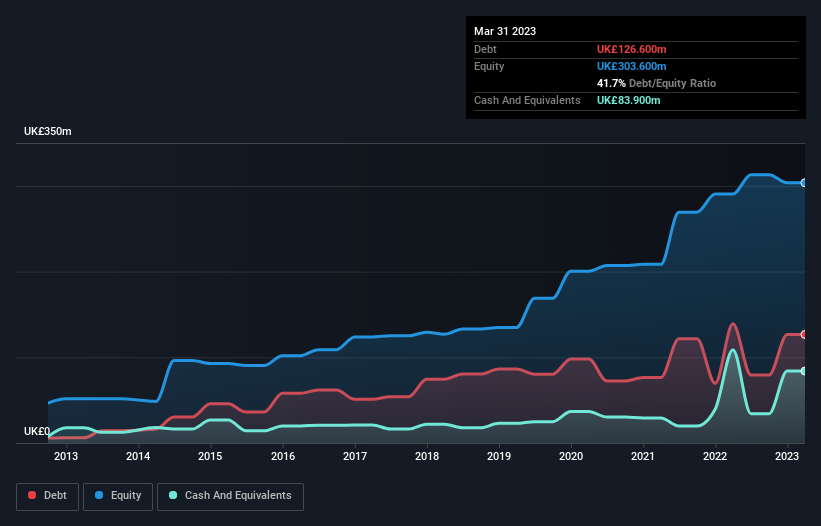Howard Marks put it nicely when he said that, rather than worrying about share price volatility, 'The possibility of permanent loss is the risk I worry about... and every practical investor I know worries about.' It's only natural to consider a company's balance sheet when you examine how risky it is, since debt is often involved when a business collapses. We can see that discoverIE Group plc (LON:DSCV) does use debt in its business. But the more important question is: how much risk is that debt creating?
When Is Debt A Problem?
Debt assists a business until the business has trouble paying it off, either with new capital or with free cash flow. In the worst case scenario, a company can go bankrupt if it cannot pay its creditors. While that is not too common, we often do see indebted companies permanently diluting shareholders because lenders force them to raise capital at a distressed price. By replacing dilution, though, debt can be an extremely good tool for businesses that need capital to invest in growth at high rates of return. When we examine debt levels, we first consider both cash and debt levels, together.
Check out our latest analysis for discoverIE Group
What Is discoverIE Group's Debt?
The image below, which you can click on for greater detail, shows that discoverIE Group had debt of UK£126.6m at the end of March 2023, a reduction from UK£139.0m over a year. However, it also had UK£83.9m in cash, and so its net debt is UK£42.7m.

A Look At discoverIE Group's Liabilities
The latest balance sheet data shows that discoverIE Group had liabilities of UK£151.2m due within a year, and liabilities of UK£130.9m falling due after that. Offsetting these obligations, it had cash of UK£83.9m as well as receivables valued at UK£73.1m due within 12 months. So it has liabilities totalling UK£125.1m more than its cash and near-term receivables, combined.
Since publicly traded discoverIE Group shares are worth a total of UK£633.7m, it seems unlikely that this level of liabilities would be a major threat. However, we do think it is worth keeping an eye on its balance sheet strength, as it may change over time.
In order to size up a company's debt relative to its earnings, we calculate its net debt divided by its earnings before interest, tax, depreciation, and amortization (EBITDA) and its earnings before interest and tax (EBIT) divided by its interest expense (its interest cover). Thus we consider debt relative to earnings both with and without depreciation and amortization expenses.
While discoverIE Group's low debt to EBITDA ratio of 0.73 suggests only modest use of debt, the fact that EBIT only covered the interest expense by 6.9 times last year does give us pause. But the interest payments are certainly sufficient to have us thinking about how affordable its debt is. On top of that, discoverIE Group grew its EBIT by 40% over the last twelve months, and that growth will make it easier to handle its debt. The balance sheet is clearly the area to focus on when you are analysing debt. But it is future earnings, more than anything, that will determine discoverIE Group's ability to maintain a healthy balance sheet going forward. So if you're focused on the future you can check out this free report showing analyst profit forecasts.
Finally, a company can only pay off debt with cold hard cash, not accounting profits. So the logical step is to look at the proportion of that EBIT that is matched by actual free cash flow. Happily for any shareholders, discoverIE Group actually produced more free cash flow than EBIT over the last three years. That sort of strong cash conversion gets us as excited as the crowd when the beat drops at a Daft Punk concert.
Our View
The good news is that discoverIE Group's demonstrated ability to convert EBIT to free cash flow delights us like a fluffy puppy does a toddler. And the good news does not stop there, as its EBIT growth rate also supports that impression! Zooming out, discoverIE Group seems to use debt quite reasonably; and that gets the nod from us. After all, sensible leverage can boost returns on equity. We'd be very excited to see if discoverIE Group insiders have been snapping up shares. If you are too, then click on this link right now to take a (free) peek at our list of reported insider transactions.
If, after all that, you're more interested in a fast growing company with a rock-solid balance sheet, then check out our list of net cash growth stocks without delay.
New: AI Stock Screener & Alerts
Our new AI Stock Screener scans the market every day to uncover opportunities.
• Dividend Powerhouses (3%+ Yield)
• Undervalued Small Caps with Insider Buying
• High growth Tech and AI Companies
Or build your own from over 50 metrics.
Have feedback on this article? Concerned about the content? Get in touch with us directly. Alternatively, email editorial-team (at) simplywallst.com.
This article by Simply Wall St is general in nature. We provide commentary based on historical data and analyst forecasts only using an unbiased methodology and our articles are not intended to be financial advice. It does not constitute a recommendation to buy or sell any stock, and does not take account of your objectives, or your financial situation. We aim to bring you long-term focused analysis driven by fundamental data. Note that our analysis may not factor in the latest price-sensitive company announcements or qualitative material. Simply Wall St has no position in any stocks mentioned.
About LSE:DSCV
discoverIE Group
Designs, manufactures, and supplies specialist electronic components for industrial applications in the United Kingdom, Europe, North America, Asia, and internationally.
Solid track record with adequate balance sheet.
Market Insights
Community Narratives




